2nd klm. Rhodes-Lindos
85100 RHODES – GREECE
Tel. +30-22410-68770 – 3
Fax. +30-22410-62575
E-mail: [email protected]
Home
Rhodes, the largest island of the Dodecanese group and the third largest in Greece, is located in the Southeastern part of the Aegean Sea very close to the coast of Asia Minor. The total area is 1,398 sq km. The island is 78km long and 38km at its widest point and has 220 km of beachfront areas. The population is over 90,000 people, of which approximately 60,000 live in the city of Rhodes.
The island of Rhodes, also known as “the emerald of the Aegean Sea”, is famous not only for its natural beauty and rich history, but for its wines as well. Although Rhodes has been renowned for its wines since ancient times, it is thanks to the wine loving Italians, who inhabited the island between 1912-1945, that viticulture and winemaking were rediscovered after the Turkish occupation. The wine trade has flourished on the island ever since.
Rhodes, the island of the sun, is famous not only for its natural beauties, tourist sites and attractions, but also for its quality wines whose fame goes back to ancient times.
Wine is part of cultural heritage in Rhodes as well as in the rest of Greece. It is an indispensable element found in Greek history, art, and folklore, and it is one of the manifestations of a distinct way of life which has evolved but not drastically changed with the passing of the centuries.
Wine in Greece has been praised as a living god – smart, humane, elegant. It has been personified as Dionysus, portrayed in exquisitely carved statues depicted on vases of unsurpassed craftsmanship.
Ancient Rhodians who were also followers of Hermes Kerdoos – the god of profit – knew the value of trade.
Thanks to Rhodes location near the mainland of Asia, its importance in the Hellenic world being a pivotal point of contact for the Greeks and the civilizations of the Orient, was disproportionate to its size.
"I crawled inside a vine, loaded with grapes, gold and beautiful, and there were black grapes on it. The vines were supported in silver bullion."
Homer
Rhodes was one of the first islands in the Aegean to adopt the cultivation of the grape vine and the vinification process. Aided by its powerful naval forces, Rhodes was undoubtedly the foremost merchant of wines and crops by the mid 7th century B.C. Rhodes was also able to undertake cereal trade on a massive scale, which brought incredible wealth to the island, thanks to its maritime power, which may also have been developed mainly thanks to the wine trade.
Excavation findings, inscriptions and literary sources are the main sources of information about wine trade in ancient times.
Thanks to this evidence we know that amphorae were mainly used in transporting and trading Rhodian wines, although other large earthen jars are also mentioned. They were also used in naval transportation of other products such as oil, olives, dried fruit, etc. In Rhodes less than 5% of the stamped handles from the amphora that were found, were foreign. This indicates that local containers and local produce prevailed and the island was self sufficient.
Amphorae came in a variety of shapes and colors. These features help us distinguish their origin. They all had narrow mouths so that they could be corked, two opposite vertical handles and at the bottom a pointed base or knob that could be used as a third handle for pouring the contents when inverted. Evidence leads us to the conclusion that this type of amphorae was made as early as the 7th century B.C.
In 4th century B.C. amphorae from Rhodes are clay vessels, with a creamy surface, peg tip, simple rim and acute-angled handles. They are also marked with a pair of stamps containing the rose or the sun rayed head of the sun-god Helios. These are also used as emblems on the coins of Rhodes. The stamps also contain two names. The one was an endorsement of a licensed manufacturer and the other the name of an annually appointed official (i.e. eponymous priest of Rhodes) which served as a date/month point. At that time there must have been reference lists of the authorities and dates marked on the stamps. Unfortunately, to-date no records of these lists have been found. The ceramists inscribed their names and a cluster of grapes on the amphorae they produced – proof that the amphora came from a Rhodian workshop and its contents from a Rhodian vineyard. Many centuries later the indication of “Appellation Controllée” was adopted by the French. This is now a common international practice.
Before the above mentioned amphorae were adopted by the Rhodians in the late 4th century B.C. other shapes with handles having a rounded arch were used. With time they went out of use.
Amphorae were indispensable to trade and their shape was perfectly adapted to their use. Their pointed base ensured a good fit between amphorae placed horizontally in two or three rows in the holds, improving the ship’s balance and optimizing use of space.
The study of these commercial vessels is the key to the history of wine trade in antiquity. The shape of amphorae was characteristic for each city-state to such a degree that it often also became its currency symbol.
Stamped handles of Rhodian amphorae have been found throughout the Mediterranean area and in hundreds of ancient sites around the Danube River, the Black Sea and even as far as India.
Substantial figures – 100,000 sealed Rhodian handles now in the Alexandria Museum, hundreds of Rhodian handles discovered in Sicily, Istria, Pontus, Carthage, Corinth, Athens (40,000 vessels mainly of the 3rd and less of the 2nd century B.C.), Delos, Crete, Cyprus, and Palestine – bear testimony to the massive and continuous export of Rhodian wine to the majority of trade centers of the world. Since no reference lists have been found most of the dating is based on clues derived from cities where vessels were found and people ruling.
Amphorae found in Carthage and Corinth had to be made before the middle of the 2nd century B.C since they were completely destroyed in 146 B.C and remained abandoned for over a century.
The 800 Rhodian stamped handles that were found together under a building in Pergamus are dated in the early 2nd and late 3rd century B.C. In addition, the forty names of annual officials help to narrow down the dates from 220 to 180 B.C. Since no listings of officials are available, archeologists had to use other criteria and methods to identify the production and trading periods. Pergamous, after the first years of King Attalos I (241-197 B.C.) reign, developed good relations with Rhodes. We know that he was not on good terms from the very beginning because Pergamus is not on the list of contributors for the rebuilding of Rhodes after an earthquake destroyed the city in 226 B.C. Further evidence show us that, during the following reign of Eumenes II (197-159 B.C.) at Paramus, ties with Rhodes were once again broken as no trade took place.
The reason why so many Rhodian handles were found in the ancient city of Alexandria is that there were very close ties between Rhodes and Egypt, which was ruled by Greeks – the Ptolemies – descendants of Ptolemy, a Macedonian general under Alexander the Great.
A substantial number of well-preserved Rhodian amphorae were found in the boat Kyrene, now exhibited in a gallery of the Crusader Castle at Kyrenia in the Turkish-occupied part of Cyprus. To this date the Kyrenia Ship represents the best preserved hull of the Classical Greek period ever found. The vessel markings found on the ship place the wreck at the end of the 4th century B.C. just when the empire of Alexander the Great was disintegrating as he was dying.
The respected reputation of Rhodian wine continued well into the period of the occupation of the island by the Knights of Saint John (1309 – 1522 AD).
When Ottoman Turks occupied the island in 1522 – following a siege of 177 days – agriculture in general and vinticulture in particular began to shrink due to the disincentives imposed by the Ottomans on Rhodian farmers and tradesmen. These disincentives were imposed in retaliation for the help that the Rhodians offered to the Knights during the siege. The inhabitants of the other islands of the Dodecanese enjoyed privileges offered by the Ottoman Empire. In a few decades vinticulture reached an all time low.
The Italians, who were to succeed the Ottoman rulers from the first half of the 20th century, took a lively interest in reviving agriculture in Rhodes.
During the period of Italian rule, the vines of Rhodes – although not systematically cultivated – made up for a great part of the agricultural economy of the island.
The first reference to Rhodian wine is by Aeschynes, an Athenian politician who was exiled to Rhodes in 330 BC. In his fifth letter he mentions that he stayed in a small house with a garden in Kamiros, and that he was offered oil, honey, and an excellent wine, which he appreciated as better than the Athenian one.
Roman Aulus Gellius, who studied in Athens and later composed the so-called Attica Nights, wrote about Aristotle (384-322 BC) – particularly about the last year of his life. When the great philosopher Aristotle, became ill his pupils asked him to recommend the pupil who would succeed him as the head of his school. There were two candidates – Theophrastus from Lesbos, and Eudemus from Rhodes. Aristotle complained that the wine he drank was not good for him, that it was unhealthy and sour, and he asked to be provided with wine from Lesbos and Rhodes in order to choose the one he liked best. His pupils readily fulfilled his wish, and after tasting the Rhodian wine, Aristotle said: “This is a truly healthy and pleasant wine.” Then he asked to be served the wine from Lesbos and commented as follows: “These are both really good wines, yet the wine from Lesbos is sweeter.” It was obvious to all that, by commenting on the two wines, Aristotle pronounced his verdict on the issue of his succession.
Aristotle wrote a study on intoxication, of which only fragments survive. One of these refers to Rhodes: “The potions named Rhodian are used in wine-drinking contests for their pleasant taste and because they make wine lighter when warmed up. This happens because myrrh, fragrant absinth, and other herbs are boiled in water before the potion is added. When this liquid is added to wine, it makes it less heady.” He continues: “The Rhodian potion is made by mixing myrrh, fragrant absinth, anise, chrysanthemum, cardamom, and cinnamon with water. The liquor thus extracted prevents drunkenness to such a degree that even sexual desire is deflated, making people calm”.
According to Diodorus from Sicily, when the new city of Rhodes was founded by merging Lindos, Camiros, and Ialyssos, Rhodians erected in the lower part of the city, near the marketplace, a temple called Dionysion, to honor Dionysus, god of wine.
Geographer Strabon saw the Dionysion in the 1st century BC and commented on the votive offerings there. The Dionysion and its works of art were also mentioned in the 2nd century AD by orators Aristeides and Pseudolucian.
The inscriptions found on the island inform us about the festivals devoted to Dionysus. For example a decree from the 2nd century BC in honor of Dionysodorus mentions Baccheia, a biannual festival. Bacchic festivals are also mentioned in a list of priest names found in Camiros, dating from the 1st century.
Another inscription from Camiros dating from the 3rd century BC, informs us that the priest must sacrifice a young cow and a sheep to Dionysus. There were also records from the 1st century records, that priests must sacrifice a goat and a one-year-old lamb to God of wine.
Other festivals devoted to Dionysus were the famous “Rhodian Smynthia,” whose name is derived from the word “sminthos” – a rat. There was a myth that said when rats damaged the vines, Dionysus killed the rats. The festival was made in commemoration of this myth.
Greece has 28 Appellations of Origin, two of which are in Rhodes. Specifically:
RODOS AOC ( Appellation of Controlled Origin)
It includes the areas that cultivate the variety white Muscat of the municipalities of Rhodes
RODOS VQPRD (Appellations of High Quality Origin)
It includes two zones, the one of the white grape variety “Athiri” designated between the municipalities and the other is of the red grape Amorgiano that includes the municipalitites Kritinias, Monolithou, Agiou Isidorou, Apollonon, Embonas, Salakou, Mandrikou, Kalavardon, Fanon, Soronis, Theologou, Damatrias and Maritson.
Location: Aegean Islands (Santorini, Rhodes)
Characteristics: White or black grape variety with light aroma very creamy. It is blended with Asyrtiko.
The Athiri grape has a bright, golden green color and is small and juicy. Its wine’s, with a fruity and fresh taste, have a soft aroma and vibrant color and caress all the senses. Because of the type of vine and climatic conditions, yield per acre is small. Athiri is by far the most widely planted white variety on the island. Aside from Rhodes it is also cultivated in other parts of Greece such as Santorini and Halkidiki.
Location: Aegean Islands (Paros, Rhodes) and Crete(Archanes, Peza)
Characteristics: Black grape variety. Yields sec, doux semi-aromatic wines
Also known as: Amorgiano, Mandilari, Kountoura Mavri, Doubrena Mavri, Pargiano.
Mandilaria is a red variety grown in almost all of the islands of the Aegean Sea.
It is a bright variety (often called Bafra), moderate acidity, a high level of tannins often referred to as “rough”, relatively low alcohol and moderate-intensity fragrances reminiscent of black fruit, skin and spices. Wines produced by 100% Mandilaria need time to soften their tannins.
In Crete in most cases we meet Mandilari with Kotsifali in order to enhance the aromas and the alcohol and to moderate its tannins, in Paros mixed with the white variety Monemvasia and in Rhodes with international red varieties. In Santorini it is used for the production of sweet roasted red wines.
It is a variety with a strong aromatic character reminiscent of exotic fruits, citrus, flower aromas, green peppers and herbs. It has moderate acidity, a high alcoholic degree and shows very good synergy with oak. Wines can age for 4-5 years. The sweet wines of this variety are also worth mentioning.
Muscat of Rhodes, occupies a relatively small area. The varieties allowed are Muscat White and Muscat Trani. White wines can be either naturally sweet (vin naturellement doux) or natural sweet (vin doux naturel – liqueur wine). The areas of Muscat Trani are limited. These are wines with moderate acidity and body, lemon flavors of citrus and rose. Unlike other wines of this variety, they are not distinguished by their great aging potential.
Mavrothiriko, or black Athiri, is an ancient Greek variety that revived in the last five years and is expected to be characterized as the variety-quintessential renaissance of Greek modern red wines.
Moderate grapes with moderate berries. Low acidity, good color intensity, high pH. Interesting aromatic profile.
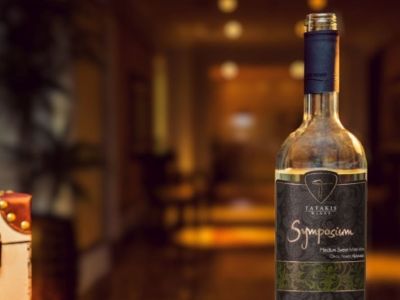
The Tatakis Family winery is located in the Southern part of Rhodes island in Gennadi Village, fourteen kilometers away from the historical village and the Acropolis of Lindos. This is where the wines are produced with special care through traditional methods but with modern philosophy. Not only local varieties of grapes such Athiri, Amorgiano, Moscato but also international varieties like Cabernet Sauvignon, Merlot and Chardonnay are used for the production of the company wines.
ΤΑΤΑΚIS WINES
105 Iraklidon Avenue, Rhodes
Tel:+30 22410 32027
[email protected]
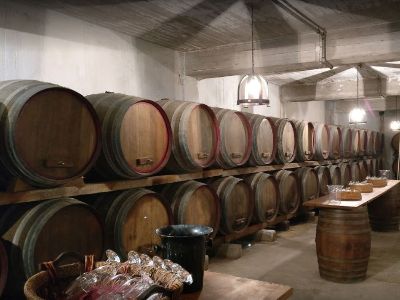
The Emery winery, still one of the largest in Greece, was built in 1974 in the village of Embona at an altitude of 700m. The vineyards are cultivated on the northwesterly slopes of Mount Attaviros, celebrated for the quality of their Athiri and Amorgiano (Mandilaria) grapes, indigenous varieties known for their characteristically low yields. Decades of collaboration with local vine growers from the region, coupled with Emery’s expertise and commitment, have enabled them to build a distinctive range of quality wines from these unique Greek varietal grapes, many grown since ancient times.
Winery:
Afstralias 28 & Kolokotroni Str.
851 00 Rhodes
Tel: +30 210 6844336
e-mail: [email protected]
www.emery.gr
US Importer
Athena Importing
31-36 44th Str.
Astoria
NY 11103
Tel: 917 8341476

The Cooperative of Rhodes, located right outside Rhodes Town, is a nearly 80-year-old winegrowers’ cooperative that uses grapes harvested by island farmers to produce several highly regarded vintages, including Retsina, Muscat, and rosé. You can tour the facilities and shop for obscure labels, like the French-style sparkling Cair Brut and Cair Demi Sec.
CAIR SA was founded in 1928 and till today is one of the largest wineries in Greece.
2nd klm. Rhodes-Lindos
85100 RHODES – GREECE
Tel. +30-22410-68770 – 3
Fax. +30-22410-62575
E-mail: [email protected]
Home
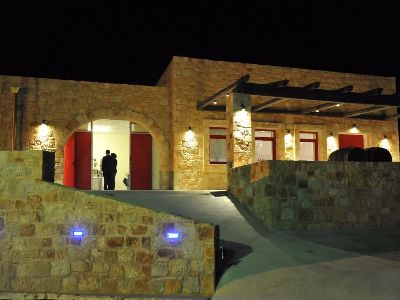
The producer Panagiotis Piperis having all the necessary knowledge to produce and deliver high-quality wine from the family vineyards.
Our facilities meet the most modern requirements in a natural earthy landscape, shaped and equipped with new generation machinery spaces in order to offer you the best possible results.
You can visit us in order to guide you in the world of production and connoisseurship. We will be glad to see you and up close!
Apollo of Rhodes main street 46
Apollo of Rhodes
P.C 851 06
Greece+30 694 742 5043
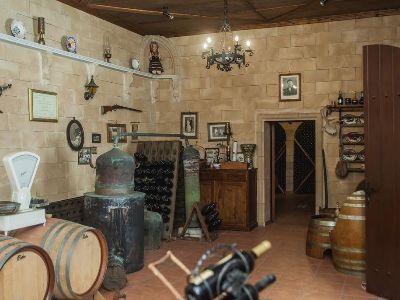
Kounaki Winery was founded in 1928 and produces small quantities of wine every year.Has 40 acres (4 hectares) of vineyard producing up to 1000kg per acre (10 tons per hectare). Cultivates Greek varieties such Athiri , Malagouzia, Muscat, Assyrtiko, and Amorgiano but also European varieties such as Cabernet sauvignon, Merlot, Syrah, Chardonnay, sauvignon blanc ,Tebranillo.
+30 694 069 5865
Embonas Village, Rhodes, 85100, Greece
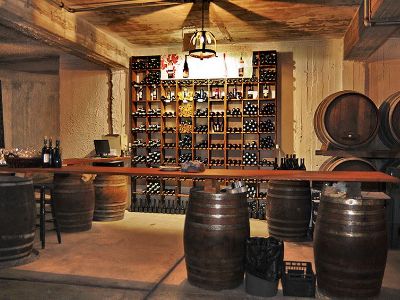
Alexandris family winery was established in 1968 cultivating organically their 4 hectares that are based on Athiri. Athiri is a rather neutral white Greek variety that in Rhodos can be elevated to different standards. The main reason according to winemaker Panagiotis Alexandris educated in Montpellier is that phylloxera never arrived in the island so one can find many own rooted vines. There are some grafted vines as well says Alexandris but old vines totally transform the variety’s potential. Diversity of soils and altitude that can reach 700 m play additionally a significant role; patches of schist tend to produce mineralic, structured wines.
Embonas 85108, Rhodes

The fascinating history of the Mercouris family, which has been growing the same variety of grapes and producing attention-grabbing wines for 150 years. For one and a half centuries, the same family on the same piece of land has been growing the same variety of grapes and producing attention-grabbing wines.
Embonas 851 08, Greece
+30 2246 041280
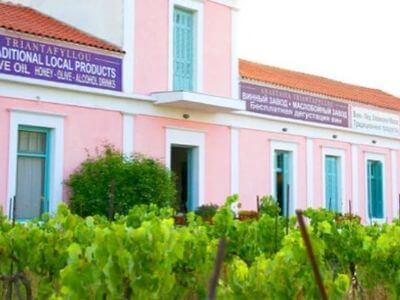
You are welcome to our guided visit of the vineyards and distillery to learn our viticulture methods. Meanwhile, you can also taste our products alongside local dishes. Our Winery is where we produce, vinify and store our wine. You are welcome to taste the wine, extra virgin olive oil and distillates that we produce. We also provide several quality local products including honey, olive oil, cosmetics and ceramics.
+30 697 3423768
Butterflies valley, Rodos
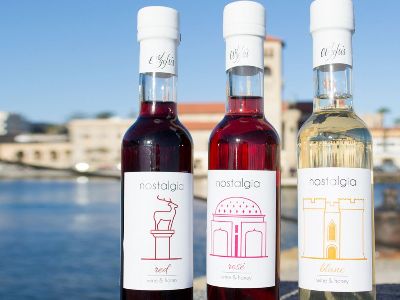
Skevou Zervou 24, Rhodes
85100 / Dodekanisa
Phone: 6946141945,6978084190
Website: www.evgefsis.gr
E-mail: [email protected]